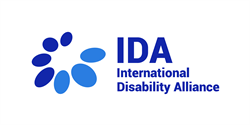
Women and girls, children, and older persons with disabilities, and those internally displaced before recent incidents each face multiple challenges aggravated during conflict.
GENEVA (PRWEB)
March 01, 2022
IDA, representing over 1100 organizations of persons with disabilities around the world, is calling on all engaged parties to respect their obligations under international humanitarian law and international human rights law to ensure protection and safety for persons with disabilities in Ukraine. In particular, Article 11 of the United Nations Convention on the Rights of Persons with Disabilities ratified by both Russia and Ukraine, and the United Nations Security Council Resolution 2475, which creates clear non-derogable obligations to ensure equal protection and safety for all persons with disabilities as well as timely and unimpeded access to humanitarian assistance.
The International Disability Alliance also calls on all humanitarian actors, including state actors and the European Union (EU) who are actively involved in providing aid to Ukraine, to ensure fulfilment of international humanitarian standards – including the IASC Guidelines on Inclusion of Persons with Disabilities in Humanitarian Action. Any international decisions, resolutions or measures adopted to address the situation in Ukraine must be inclusive of persons with disabilities facilitating their participation in decisions that affect them.
Ukraine, in particular the eastern areas, has been experiencing a humanitarian emergency since 2014. Even before the recent escalation of the situation, many persons with disabilities experienced challenges accessing humanitarian aid and safety. A 2021 OCHA report estimated that out of the total number of people in need of humanitarian assistance, at that time in Ukraine, 13 per cent had a disability. Now, with the escalation of the conflict and Russian troops in the country, all persons with disabilities are facing a high risk of losing their lives and not accessing safe evacuation, shelter and humanitarian assistance.
According to persons with disabilities and their representative organizations in Ukraine, the situation for them “is appalling. For example, shelters in Kyiv are inaccessible, so people with disabilities are forced to stay at home, not knowing where they can go.”
When conflict hits, everyone rushes to move to safe areas ensuring the security and health for themselves and their family members. But for many persons with disabilities this is not possible. Evacuation plans are often not designed in accessible ways. Persons with disabilities cannot reach metro stations and bunkers. In many cases, shelters are inaccessible for persons who use wheelchairs to enter and navigate. Information on emergency evacuation, location of shelters and how to seek assistance are not provided in accessible formats. Consequently, many people with a sensory impairment such as blind persons and those who are partially sighted, deaf and hard of hearing persons, and those with deafblindness do not understand how to access the limited safety and assistance available. The level of stigma and ignorance against persons with intellectual disabilities and persons with psychosocial disabilities increases during conflict, putting them at higher risk of being left behind in evacuations and experiencing violence and abuse.
There are groups who face additional risk. Women and girls, children, and older persons with disabilities, and those internally displaced before recent incidents each face multiple challenges aggravated during conflict. Thousands of children and adults with disabilities are also trapped in institutions facing the risk of being abandoned or of serious negligence.
The invasion has triggered swift international condemnation and pledges of support and aid to Ukraine. In particular, the conflict has led to unprecedented transformation in the region with the EU and its Member States taking action, both individually and in unison, to address the crisis. It is vital that the rights and needs of persons with disabilities are incorporated into these actions. That all relevant parties involved in providing aid and support to civilians in conflict zones understand and address the needs of persons with disabilities. A strong European response to the invasion must also be one which reflects the values of Europe of advancing human rights.
“We have strong international standards. As the representative voice of over a billion persons with disabilities worldwide, I want to remind all actors that any measures taken to address the situation and assist affected people must fully guarantee the rights, inclusion and participation of all groups of persons with disabilities according to international norms,” said Vladimir Cuk, Executive Director of the International Disability Alliance.
Share article on social media or email:

